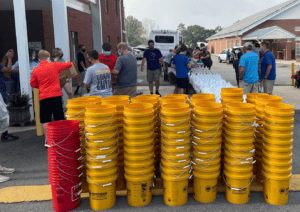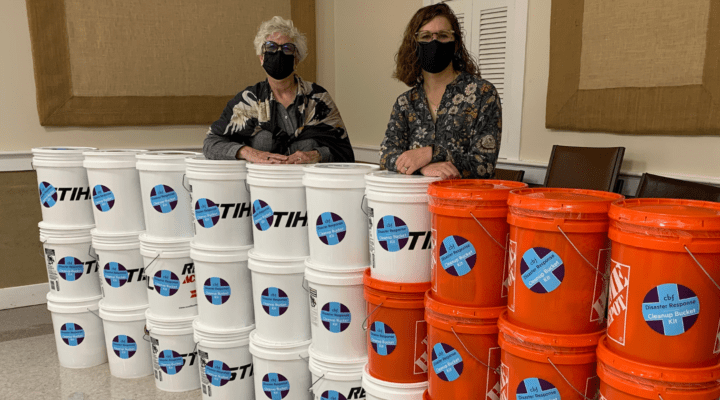The Cooperative Baptist Fellowship has turned to the bucket to counter the pandemic limits placed on disaster response ministry, said Daynette Snead-Perez, CBF’s U.S. disaster response manager.
A “1,000 Bucket Challenge” seeks individuals and churches to fill 1,000 5-gallon buckets with materials needed by natural disaster victims to start restoring damaged homes and businesses.
Nearly 430 buckets already have been assembled by individuals and congregations in multiple states, with a deadline of Nov. 30, the end of the 2021 hurricane season.
CBF has issued appeals for donations to finance the $100-worth of cleaning and other supplies that go into each bucket, as well as instructions for assembly and delivery to central storage locations in Florida, Texas and Louisiana.

Daynette Snead Perez
“Some people are giving to the campaign, while some congregations raise their own funds for the materials and then assemble the buckets,” Snead-Perez said. “A lot of churches pray over them, and they have volunteer drivers to deliver them to the collection sites.”
Feedback from participants has ventured into the spiritual, she added. “This is a real hands-and-feet approach to disaster ministry” in a season when most churches cannot send volunteer teams to areas affected by hurricanes, tornados, flooding or other disasters. “This is how we adjust in the midst of a pandemic.”
The bucket challenge has been a gift to those unable to travel to affected areas but who remain eager to do more than give money for disaster response, said Dave Hawes, pastor of Godwin Heights Baptist Church in Lumberton, N.C., and CBF global disaster response volunteer coordinator for North Carolina.

Dave Hawes
“These buckets have been a fantastic ministry for us and for those they help. It’s a tangible way to give,” he said. “It feels like a healthier version of Operation Christmas Child because we know where this is going and there are no strings attached.”
And the process can be undertaken by individuals, families, churches or even larger “bucket brigades” like one coordinated by CBF North Carolina in September that produced 209 buckets for Hurricane Fred victims in Western North Carolina.

The bucket brigade at work for CBF North Carolina.
Participants included members of several congregations and college students who gathered at Hominy Baptist Church in Clinton, N.C. “It was a well-oiled machine,” he said.
And it was such a success that a larger-scale project is being contemplated by the North Carolinians in the spring of 2022 — ahead of hurricane season.
“We can give money, and money is needed, but this is a tangible, physical thing that we can do,” Hawes said. “In a sense it is ‘When did we see you flooded out, Lord? When did we see you homeless and without a roof over your head?’ It is that kind of ministry.”

David Wells
The bucket-assembling ministry has proved a fulfilling substitute for those used to traveling to disaster areas to rehab damaged homes and communities, said David Wells, disaster relief coordinator for CBF Tennessee and a deacon at Ball Camp Baptist Church in Knoxville.
“Prior to the pandemic, we were doing three to four out-of-state mission trips a year” to help victims of natural disasters, he said. “But then COVID hit and we did not feel comfortable taking those trips. Now these buckets are the next best thing because the disasters don’t stop — Mother Nature doesn’t stop because there is a pandemic.”
Last November, 25 buckets assembled by members of three CBF Tennessee congregations were delivered to Florida, followed by another 33 in July. At a gathering of CBF pastors next month another 100 buckets will be assembled for storm victims in Louisiana, Wells said.
“We get to put these buckets in the hands of homeowners to give them a solid start cleaning up their homes with materials that are not available where they live because of massive runs on the stores in their areas,” he explained.

Lane Riley
Participation also can be transformative for the churches that engage in community bucket assemblies, said Lane Riley, associate coordinator of CBF South Carolina and disaster response volunteer coordinator.
Augusta Heights Baptist Church in Greenville, S.C., put together 38 buckets during an interactive Sunday morning worship service where the congregation was able to assemble the buckets during a special litany and pray for the people who would receive them.
The youth group at First Baptist Church in Clemson, S.C., assembled buckets as a group activity, Riley said, adding that congregations are being drawn closer together in the process.
“They get to see all the supplies that go into them, while praying for the families that will receive them. It’s a very meaningful way to be involved because it helps people visualize what people need after a storm,” she explained. “I also love the intergenerational aspect of this. I’ve seen young children assembling buckets alongside the oldest members of a congregation.”
Related articles:
CBF’s new disaster response coordinator brings diversity of experiences to the job
With vaccinations on board, CBF disaster relief looks toward unfinished work in Bahamas


